#dick feynman
Explore tagged Tumblr posts
Text
kumatani was the one who told iketeru about richard feynman (to make him laugh)
#where else would our loveable idiot hear about some physicist#his (boy)friend would try and make conversation and then bam#dick feynman#life lessons with uramichi oniisan#iketeru daga#kumatani mitsuo#yes i know this is only in the english dub i havent watched the sub but i assume its closer to the english translation of the manga#which is also funny but i have to give the english voice actors a pat on the back for really making the show their own
27 notes
·
View notes
Text
have also decided this morning that feynman in her early 20s has a ‘pickman in zevunzolia’ arc where she goes to join the abeyants (<- weird mar religion collective) and is like THEEEE most eligible lesbian bachelor there for like 6 years her fucking name is ike and her one true passion in life is dying in a cave and everyone is like ohhhhh i can’t not fuck her
#pers#s/n#she’s like a hugely egotistical self important dick during this time too like she’s not ever once been a nice person#in fact modern day feynman is about the chillest we get her and that is SAYING something#i just think it’s really funny for her to have a mid 20s string of toxic relationships that she keeps ending on horrible terms#while living with a bizarre mar cult that she doesn’t really believe in. LIVE HER
5 notes
·
View notes
Text
Let’s not forget he was a massive creep and beat his second wife. He was disgusting.
https://thebaffler.com/outbursts/surely-youre-a-creep-mr-feynman-mcneill
When a physicist falls in love :)
Richard Feynman's love letter to his deceased wife, 1946.

#richard feynman#dick feynman and i mean it#i absolutely cannot stand people that idolize this man and refuse to admit he was a wife-beater and harassed his female students#i'm sorry for bursting everyone's bubble but i can't stand this man#or his fans
40K notes
·
View notes
Text
Moreover, the memories of observers in the two galaxies would be operating in opposite directions. If you somehow succeeded in communicating something to someone in a time-reversed world, he would promptly forget it because the event would instantly become part of his future rather than of his past. "It's a poor sort of memory that only works backward," said Lewis Carroll's White Queen in one looking-glass,time-reversed (PT-reversed!) scene. Unfortunately, outside of Carroll's dream world, memory works only one way.
Can Time Go Backward? (1967), by Martin Gardner
#im throwing up#énouement#not me needing a tag for quantum theory. the things we do for dick (richard p feynman).
0 notes
Text
The Feynman Affair
Here is the result of the poll from the other day.
A/N: As usual, everybody in this is fictionalised and based on the performances of the actors in the Nolan movie, if you don’t want to read this I am not forcing you so please simply scroll on. I am not brooking any arguments, most of us on here are just doing are here for fun, not confrontation. If you do want to read it however, welcome, I promise I’m not always this grumpy!
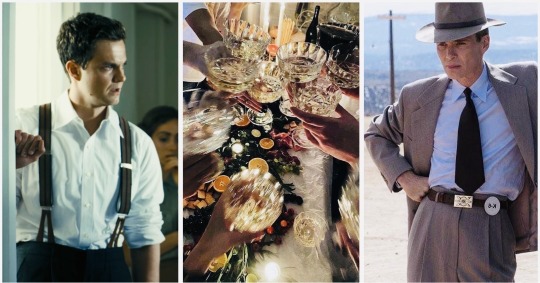
Warnings: period typical attitudes, alcohol consumption, suspicion of adultery, angst but a happy ending.
Your relationship with Robert was the best thing that could ever have happened to either of you, though you both acknowledged that it was bizarre in its beginnings. You were a political science student at Berkeley that he had met just before the war had started and whisperings had begun about he production of the ‘gadget’. You had hit things off really quickly and when Groves started talking about moving work to a more secure, remote facility Oppie knew immediately that he wanted to keep you by his side. He asked you to marry him shortly after that, having taken you to New Mexico to spend a few days just the pair of you at his ranch Perro Caliente. He was open with you about what was going to happen next in his life and that he knew Groves would let you nowhere near the project unless you were a married couple. You were anxious at first, Robert was a lot older than you and at a far more advanced stage of life, you also knew that you were going to have to put your studies on hold and the idea of becoming his little housewife was fairly unappealing to you. You kept all of these concerns to yourself though, knowing that if you said no that you wouldn’t see him for a very long time, which was the last thing that you wanted to happen.
Your differences were never really much of an issue, you had mixed in similar circles at Berkeley and he continued to make sure that you got involved in things at Los Alamos. He was far from controlling or misogynistic, getting you a job as an administrative assistant to help organise the chaos of the laboratory, hell, he even cooked on a regular basis. He made it perfectly clear to everyone that you were to be considered as his equal, an extension of him that was to be treated with the same respect. Robert did his best to make sure that you rarely felt marginalised due to your age or sex, little did you know this was because he was nervous that he was too old and out of touch, you were spending a lot of time working with younger men and he was beginning to feel a little threatened. He made sure that his insecurities stayed a long way away from you though, after all you never gave him any reasons to worry.
~
You were starting to spend more time with a young physicist called Richard Feynman, Oppie has seen something in him and gone to great efforts to bring him onto the project. He was in his mid twenties, close to you in age, and a gifted conversationalist. Judging by the gaggle of women that usually surrounded him, Robert also judged that he was considered fairly attractive by the opposite sex. Though Feynman had a wife who was currently in a hospital in Albuquerque and suffering from tuberculosis, this did little to settle his nerves. You always used to spend your lunchtimes together, you’d eat whatever sandwich you had made that morning, Robert substituting any food with a cigarette as had become his habit (which you hated). You had missed a few of these recently though because you “Got stuck in a meeting with Dick, he was having a rant about Groves, you know how we all feel about him.” Though he hated to admit it Robert was beginning to feel something more than just anxiety, he was jealous. Why did Feynman suddenly deserve to spend so much time with you when he was losing out on it? Did you find him boring and deliberately avoid him? Why had he even gone to the effort of talking this bastard into coming here in the first place?
~
Over the next few weeks things calmed down a bit. Robert had spoken to Rabi about his concerns, he was one of the few of Oppie’s friends who could tell him outright when he was being ridiculous and he had done so.
“But are you sure that she isn’t tiring of me?” He had said one morning, sitting in his office in the middle of a rare catch-up with his visiting friend and advisor.
“Oppie, don’t be such a fool. Y/n loves you, she still looks at you the same way she did when you signed your marriage certificate. Besides, Richard loves his wife just as much as you love y/n, he would never have an affair. You’re worrying about nothing.”
“You don’t think it’s my age, she doesn’t feel that I’m boring now that we’re living together?”
“No, but if that’s your worry then do something exciting. Have a party for your 39th and invite everyone, including Feynman. Prove to her that you can still enjoy yourself.” Oppie paused for a moment in thought before replying.
“Thanks Rab, I think I will.”
~
That was where he was now, a big party to celebrate his 39th birthday. Everybody was milling around, locked in various conversations. He had no idea how many martinis he had made that evening and the atmosphere was beginning to become a little more chaotic, the alcohol hitting everyone more quickly than they expected due to the altitude. You had been by his side for most of the night, sitting next to him for the meal and having your first dance of the evening with him, allowing him to lead you around in his favourite foxtrot even if you did tease him about being a bit behind the times. You admitted that you loved his old-fashioned foibles though, you said that it made you feel special. The event only started to go sideways after you and he had got involved in a group discussion, it had inevitably turned scientific and his attention was immediately focused on Rabi and his last posed question. He hadn’t noticed that you had left part-way through the discussion, now being nowhere to be seen.
Rabi twigged his friend looking around the room, noticing quickly himself what was missing. He also noted the Richard Feynman was nowhere to be seen.
“If you’ll excuse me, I think I’m going to go and fix myself another martini,” Robert said, downing the dregs of his previous one and walking in the direction of the kitchen.
“I think I’ll follow him, make sure that he doesn’t get lost on the way,” joked Rabi, following closely behind the host.
As soon as the pair made it to the kitchen Robert burst into an uncharacteristic rage.
“I knew that something was going on, I should have done something to stop her sooner, I just didn’t want to believe it. I could forgive her if she had been discreet about it, but really? On my birthday?”
“Oppie, calm down. I know that y/n and Feynman are both gone, but we don’t know where. They might not even be together.
“Well, where else do you think they could be then?” Even the level headed Isidor was having to admit that the prospect of your affair was becoming increasingly likely. The men suddenly heard movement from the room above them. Your bedroom.
At that moment there was nothing to stop Robert from tearing up the stairs, his friend in tow. He threw open the door to find you and Richard sat side by side on the bed, hunched over something between you with your backs to him. You both snapped around at the bang or your husband’s entry.
“Mr Feynman, would you care to tell me what you are doing in my bedroom with my wife?” God, you had never seen your husband this angry, he was positively seething.
“Dr Oppenheimer, I can assure you that nothing untoward is going on, we were merely…”
“Well, something certainly seems to be going on, don’t you thing Rab?” Robert cut him off.
“Robert, this is none of my business, I’m going to go back down to the party. I’ll keep everyone entertained so that you can take as long as you need up here.” He patted his friend on the shoulder in support, closing the door as he left.
“Now, I want to hear the truth. I’ve had my suspicions about you both for a while, but I suppose at least now I know for certain. Some birthday present.” Dick was trying to be a gentleman and take the brunt of your husband’s onslaught, you were trying to discreetly move the piece of paper that you had both been looking at.
“Sir, honestly, man to man, nothing is going on between me and your wife, I would never even want to touch her.” Oppie raised his eyebrows at that.
“So you fuck my wife and then have the balls to insult her. Stylish Feynman.”
“That came out wrong, I meant that I would never want to do something like that to my wife, I would never dream of jeopardising my marriage.”
“And yet you are happy to destroy mind?”
“Um… no, I…” you rolled your eyes at Dick, he was making everything so much worse than it already was.
“Shut up, you’re just making things harder you idiot.” Richard happily did as he was told.
“Robert, this wasn’t how I wanted you to find out, but…”
“So you are sleeping with him then?”
“No, would you please let me finish?” Robert had nothing to say to that, so your carried on. “For the last few months me and Richard have been working on something for your birthday. He and his wife write letters to one another, but they do it in code so that Groves and his idiots can’t understand it, they’re so thick that they still haven’t managed to figure it out. I know how much you miss your brother, so we managed to get some friends to ask Frank to write to you. Richard had his wife put it into code and send it to him so that you could receive it on your birthday. We came in here so that he could give me the decoded version to surprise you with later. Obviously you have ruined that, so you might as well have it now.” You walked over to Robert, holding the paper out to him. He was completely dumbstruck.
“I suppose I owe you both an apology then.” You knew how much Robert would hate having to put his pride to one side and admit that he was wrong. “Feynman, I’m sorry for doubting you and thank you for helping my wife.”
“No worries Oppie, I understand. I’ll leave the pair of you to it.” He stood from the bed, shaking his boss’s hand before exiting, still visibly shaken.
Robert immediately reached out to you, taking you in his arms.
“Love, I’m so sorry. This is all my fault, I was just nervous that you had grown bored of me and Feynman could have given you so many this that I don’t have.”
“Like what Robert?”
“Youth for one.” You suddenly started to laugh.
“What’s funny, why are you laughing?”
“You idiot Rob, did you really think I would have married you if your age was that important to me? If it will make you less nervous in the future, you should know that I prefer my men older, they tend to cause less problems. I would never even dream of having an affair.” Your husband relinquished his grip on you then, letting you move back to face him. His face was awash with shame.
“Can we forget that this ever happened? I just want things to go back to how they used to be.”
“I think that sounds like a very good idea,” you acquiesced. “Let’s leave that letter up here, put it under my pillow where I was going to hide it and I’ll give it to you later like I was planning to. Then we can head downstairs and pretend that this little incident never happened.” Robert did as you suggested, wrapping an arm around your waist before leading you out onto the landing.
“Oh, one more thing before we go back down. You can’t tell anybody about that letter or we’ll all be arrested.” Robert huffed at that.
“What on earth am I going to tell Rabi?” You chuckled at his deserved misfortune, kissing him on the cheek as you headed back down the stairs.
“That’s up to you, but it had better be something good!”
#cillian murphy#cillian murphy x reader#oppenheimer#1950s#american prometheus#oppenheimer x reader#christopher nolan#tommy shelby#peaky blinders#fanfic#j robert oppenheimer x reader#j robert oppenheimer#tumblr polls#angst with a happy ending#angst#affair#los alamos
76 notes
·
View notes
Note
Hi there! I am about midway through reading your story Lost Vocabularies and it is amazing!! The whole series has been so lovely, I’m obsessed with the way you write! The way that you convey the boys complicated emotions and capture all the little nuances of their dynamic has me feral!! Beyond even them the way you inject so much personality into the locations is so good, I feel like I am there!! So thank you for writing this lovely story 💕 I was wondering if you happen to have a list of all the books that Bucky and Steve read? I have been looking up a lot of them and adding them to my to read list bc they sound so interesting lol! On that same note, how did you decide what books to mention? Are they all ones that you have read or did you do research to find ones you thought they would like?
I’ve been coming back and rereading this kind and wonderful comment in my inbox over the last few weeks when way too many massive, stressful, time-sensitive things were all happening at once. 💕 But since I have a little breather between crazy periods, I get to dive in here as a treat.
Lost Vocabularies involved a lot of research, which I hope isn’t apparent because I didn’t want there to be any noticeable difference between the parts of the story that are based on places I’d been, foods I’d tried and books I’d read personally—and what was created purely based on research. Fingers crossed that the seams don't show!
In this series, we see both Steve and Bucky use art to process—helping them understand themselves and connect to the world again. Bucky is drawn to stories while Steve as an artist is much more visual, but the underlying impulse is similar. In the same way that you learn a lot by glancing through someone’s bookshelves, what characters read is interesting to me, and revealing. This version of Bucky is a very private person so these books offer a glimpse into his inner life. And as the POV character we get to experience all these things alongside Steve.
I’m not much of a sci-fi or fantasy reader so some of Bucky’s picks were a real challenge for me. But I wanted these to be grounded in the characters and the storytelling functions, not based on my own taste and opinions, though of course those always bleed through.

Steve’s Reading List
The Day of the Triffids by John Wyndham
Alice Neel: People Come First by Kelly Baum and Randall Griffey
The Thing on the Doorstep and Other Weird Stories by H. P. Lovecraft
The Beautiful Mysterious: The Extraordinary Gaze of William Eggleston, edited by Ann J. Abadie
One Mighty and Irresistible Tide: The Epic Struggle Over American Immigration, 1924-1965 by Jia Lynn Yang

Bucky’s Reading List
The Thing on the Doorstep and Other Weird Stories by H. P. Lovecraft
A Scanner Darkly by Philip K. Dick
QED: The Strange Theory of Light and Matter by Richard Feynman
Do Androids Dream of Electric Sheep? by Philip K. Dick
Six Not-So-Easy Pieces: Einstein's Relativity, Symmetry, and Space-Time by Richard Feynman
Nonlinear Dynamics And Chaos by Steven H. Strogatz
Stranger in a Strange Land by Robert A. Heinlein
I’ve included some notes and commentary on why I picked each of these works under the cut.
The Same River, Twice (The Man Is Still Left with His Hands)
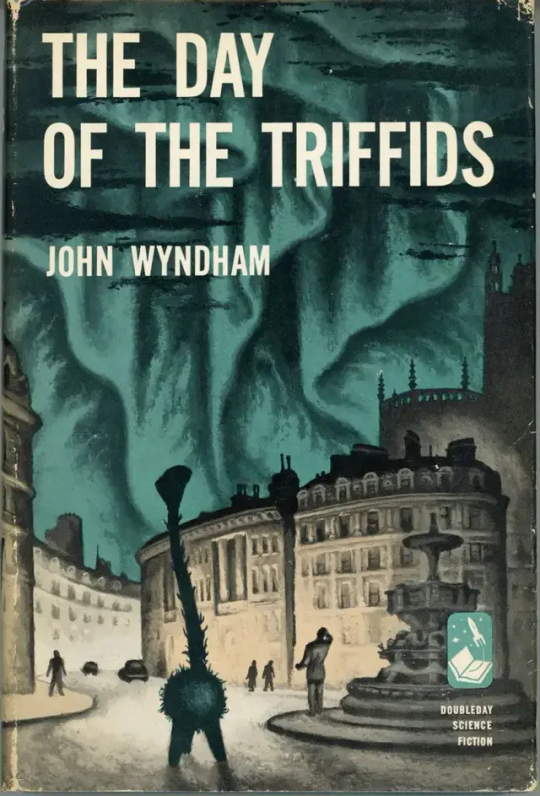
The Day of the Triffids by John Wyndham
Classic post-WWII dystopian sci-fi that focuses on society collapsing after a series of catastrophes that were unintentional but very much caused by people, which leads to a lot of the population becoming blind. Thematically this work engages with the loss of identity that people, both abled and disabled, face in the process of survival and a dark look at what happens after societies break down. How this applies to Bucky is obvious, but part of the argument of this post-Endgame series is that it applies to Steve, too.
Also, there are huge mobile carnivorous plants.
Fun fact: the opening of this novel is said to have been the inspiration for 28 Days Later!
Still Left with the River (The Paradox of Motion)

Alice Neel: People Come First by Kelly Baum and Randall Griffey
Alice Neel’s portraits are extraordinary, almost unnervingly vivid. In this story, Steve is familiar with her work as a fellow New York-based artist active in communist circles in the 1930s. She also worked for the WPA, producing wonderful street scenes that documented New York neighborhoods of the era.
To be honest, I have so many questions about what Steve was up to in the late 1930s before his war mania of the 40s hits.
One of the core themes of this series is Steve struggling with what his body is for if it’s no longer for violence. Who is he if he’s not a soldier? What is his radically changed body if it’s not a weapon? How do you come home from the war?
In this regard, Steve and Bucky have all kinds of shared life experience.
So thematically I include Neel because of her startling gift for capturing personalities and bodies through a process of frank, earnest, truthful observation of the integrated completeness of body and self: this space that’s you.
But a book of Alice Neel’s work with her sensitive portraits and fleshy frank nudes pulls him into flipping through page after page of these personalities and bodies, not idealized: seen.
Steve isn’t ready for that when he bumps into this big “impractical” art book in a holdover Barnes & Noble in Brooklyn, not when he’s still so shook up and adrift. But he will be.
There’s such empathy and radical humanism to her pieces. “People,” as she famously said, “come first.” I stand by the conclusion that Steve would love her work.
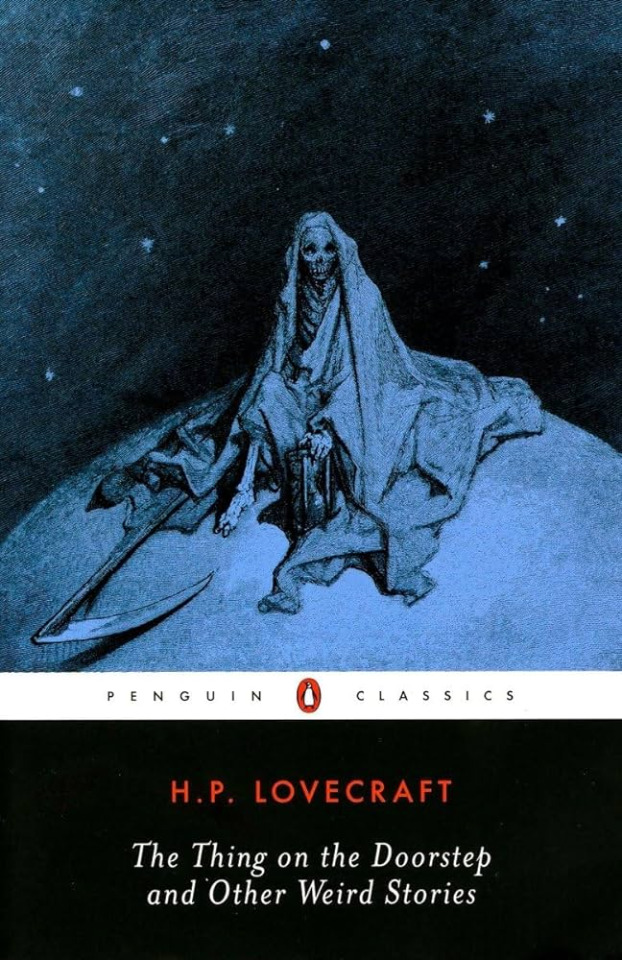
The Thing on the Doorstep and Other Weird Stories by H. P. Lovecraft
Lovecraft was relatively unknown in his lifetime—he died in 1937—but his stories were published in popular fantasy pulp magazines like Weird Tales and Astounding Stories, which is where Bucky would have come across his work. The fact that Steve recognizes Lovecraft by name means that teenage Bucky must have talked about what he was reading and the pulp stories he liked with teenage Steve, which is adorable—“this Lovecraft fellow, Steve, you wouldn’t believe the stuff he comes up with.” And Steve was paying attention enough to remember two decades and change later without the benefit of his serum-enhanced memory, which hurts my heart a little in the best possible way.
That’s how Steve all these years and decades later is able to wordlessly toss this collection of H. P. Lovecraft’s stories at Bucky on a hot hazy stumbled-upon beach in northern Florida and watch Bucky’s whole face light up.
And of course Bucky would view Lovecraft as a great beach read 😂
But this is the basis for something I’ve written into this series: Bucky excitedly sharing things he finds interesting with Steve—wanting to tell Steve first, Steve most. And although Steve is quiet, stoical and very self-contained, he’s paying a whole hell of a lot of attention.
Given that Bucky is canonically a Tolkien fan, I think the imaginativeness and ranging scope of Lovecraft’s complex, often interconnected stories would appeal to him. And, thematically, Lovecraft is distinctive for the era for having characters psychologically fragment when confronting these vast inhuman others.
“The Call of Cthulhu” opens with:
The most merciful thing in the world, I think, is the inability of the human mind to correlate all its contents. We live on a placid island of ignorance in the midst of black seas of infinity, and it was not meant that we should voyage far.
Steve and Bucky have each voyaged out a long way.
Trauma, in a way, is a form of terrible knowledge. You can heal but you can’t unknow things.
Not Language but a Map (The Grammar of Sensation)
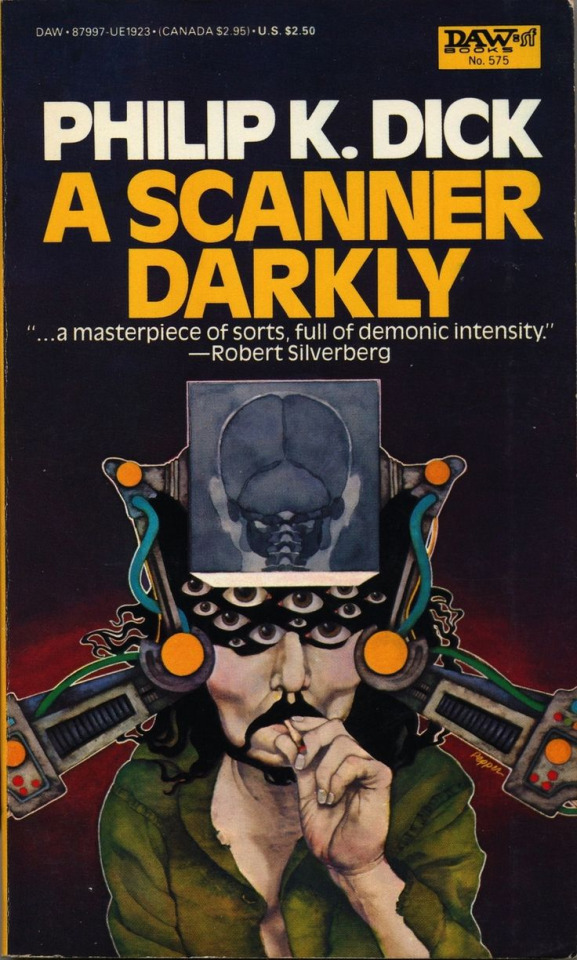
A Scanner Darkly by Philip K. Dick
This is the first book in the series that we see Bucky pick for himself. And, wow, he picks a doozy with themes of multiple and unstable identities, invasive surveillance, manipulation, psychosis, and how individuals can get chewed up by larger systems, falling through the cracks of society. Dick was writing based on his own troubled experiences with southern California drug culture of the early 70s, but this work gets at much more fundamental darknesses that I think would speak to some of the horrors Bucky has gone through and won’t talk about, not even with Steve.
Within the first few pages, we get this:
It was midday, in June of 1994. In California, in a tract area of cheap but durable plastic houses, long ago vacated by the straights. Jerry had at an earlier date sprayed metal paint over all the windows, though, to keep out the light; the illumination for the room came from a pole lamp into which he had screwed nothing but spot lamps, which shone day and night, so as to abolish time for him and his friends. He liked that; he liked to get rid of time. By doing that he could concentrate on important things without interruption.
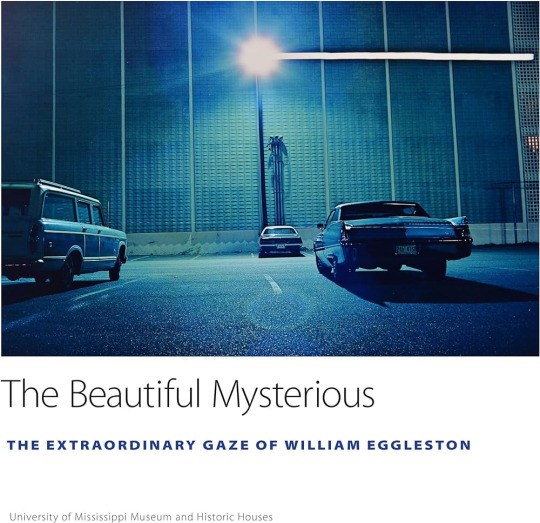
The Beautiful Mysterious: The Extraordinary Gaze of William Eggleston, edited by Ann J. Abadie
Eggleston was an early pioneer in color photography and that fascination with color is very apparent in his work. I think this focus would grab Steve as an artist who doesn’t take seeing the full spectrum of color for granted. Even in the MCU’s thin action-film scripts, Steve comments on things that offend his aesthetic sensibilities even when that has absolutely no bearing on the situation at hand, from Stark Tower to Lang’s van.
Not even a world-ending crisis can keep Steve from going, wow, no, that’s ugly. I enjoyed running with that 😂
Steve’s view of Eggleston’s photographs shifts over the course of the series, reflecting what he’s feeling, from the fragmented and disconnected detachment—“isolated and off-kilter”— that he sees in them at the beginning that shifts to the passionate engagement in the world he finds in them later.
Steve looks through the whole book of William Eggleston’s photographs again and at first the colors still roll over him like the shockwave of a distant explosion, all he can focus on. But gradually the subjects and compositions pull forward, too: monumentalized images of the everyday that at first seem neutral, the work of a detached observer. But the off-center framing of ordinary life is so deliberate as though everything might be important and where every detail deserves attention—that’s nothing like neutral. That’s not detached at all. You have to care a whole hell of a lot.
This mirrors the journey this post-Endgame Steve goes on. Because Steve Rogers should be a character who cares a whole hell of a lot, not what the MCU writers eventually reduced him to. And that’s what this fix-it is trying to fix.
Lost Vocabularies that Might Express (The Memory of These Broken Impressions)
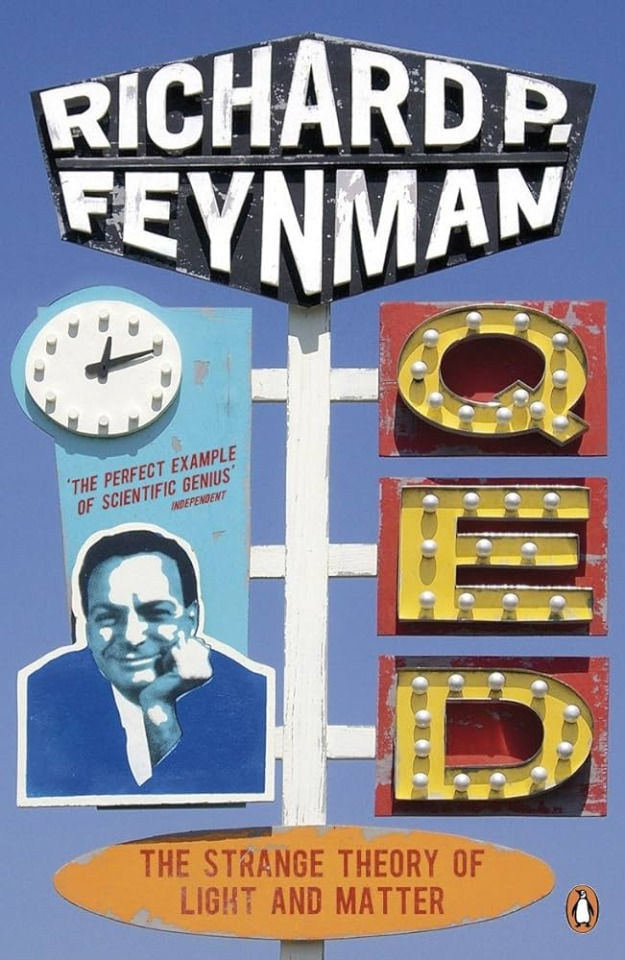
QED: The Strange Theory of Light and Matter by Richard Feynman
I love writing Bucky as a big fucking science nerd. His last night in New York and how does he want to spend the time? At a science fair with his best friend and a couple of pretty girls. So Bucky reading about quantum electrodynamics is delightful to me. The thing is, though, Bucky is a bright enough guy with a high school education. He’s not a genius—and the MCU is lousy with geniuses. But if Bucky wanted to learn a little more about all this quantum stuff he heard about in passing during some vague and very improbable sounding explanations, which by the way also allowed one of the few people still living who truly matters to him and the closest thing Bucky had left to family to fuck off to the past, well, Feynman’s QED isn’t a bad place to start in understanding some of this quantum stuff, at least.
Feynman here is very much writing for a popular audience. His writing is conversational—the book is adapted from a set of lectures he gave—and his voice is witty, casual and surprisingly light, but at the same time Feynman is deeply invested in helping lay people understand quantum mechanics. The book opens with:
Alix Mautner was very curious about physics and often asked me to explain things to her. I would do all right, just as I do with a group of students at Caltech that come to me for an hour on Thursdays, but eventually I’d fail at what is to me the most interesting part: We would always get hung up on the crazy ideas of quantum mechanics. I told her I couldn’t explain these ideas in an hour or an evening—it would take a long time—but I promised her that someday I’d prepare a set of lectures on the subject.
I prepared some lectures, and I went to New Zealand to try them out—because New Zealand is far enough away that if they weren’t successful, it would be all right! Well, the people in New Zealand thought they were okay, so I guess they’re okay—at least for New Zealand! So here are the lectures I really prepared for Alix, but unfortunately I can’t tell them to her directly, now.
C’mon! Tell me Bucky Barnes would not be hooked by this opening.
Thematically, and more seriously, the question of how could Steve do this? has two very different meanings. So far in this series Bucky isn’t ready to confront the harder version of that question which comes potentially with some very painful answers: how could Steve make that choice? Nope, he’s not ready for that. Instead, his brain unconsciously takes the easier way out: trying to understand quantum electrodynamics. 😂😭
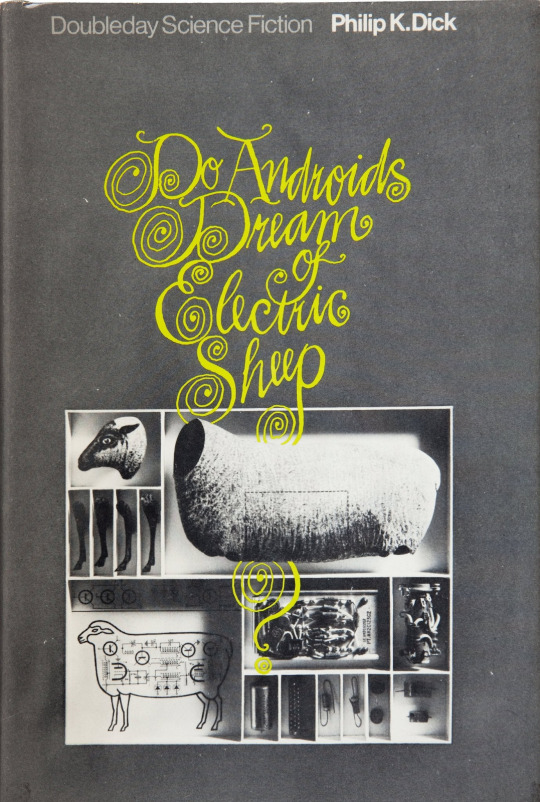
Do Androids Dream of Electric Sheep? by Philip K. Dick
Bucky must have liked A Scanner Darkly, because he went for another Philip K. Dick novel. Today remembered mostly as the source material for Blade Runner, this bleak dystopian novel is set in the aftermath of a devastating nuclear war that destroys most life on Earth. The work has themes around empathy—who feels empathy and for what?—materialism and what really makes us human.
I find it interesting how Sebastian Stan talks about The Winter Soldier in terms of someone who has undergone a process of total desensitization, which to varying degrees is deliberately part of the training of all soldiers. But rebuilding his core sense of empathy was one of the things Bucky chose to do as soon as he had any agency in that two-year period where he was on the run, which is remarkable. As a person who has been treated as though he wasn’t human and had his empathy forcibly stripped from him, I think Bucky would have a lot of complicated feelings about the enslaved androids who escape but are ruthlessly tracked down and killed. Some of these escaped androids are dangerous and do lack basic empathy—shown in the book by torturing and mutilating an animal—while other androids seem like ordinary people just trying to live their lives.
I like that Bucky talks about the book with Steve later in the story, returning in my view to a very old habit of bookworm Bucky wanting to share what he’d been reading with Steve <333
“I need to find something to read next,” Bucky says after wrapping up his description of an imagined religion that involved plugging into a box to virtually suffer the existence of a man forever walking up a steep hill while struck by crashing stones.
“Well, did the androids dream of electric sheep?” Steve asks.
“Who knows?” Bucky knocks into him gently as he takes the bowl Steve passes over. “They just wanted to be free. Though the free people just wanted to own stuff or plug into a box and suffer. So, you know, sort of a grim outlook. ”
“A little light, cheerful reading.”
“Hey, we live in a world where people write ‘Take back what’s yours’ in the streets and then smash up the windows. Dystopias don’t seem so far off the mark.”
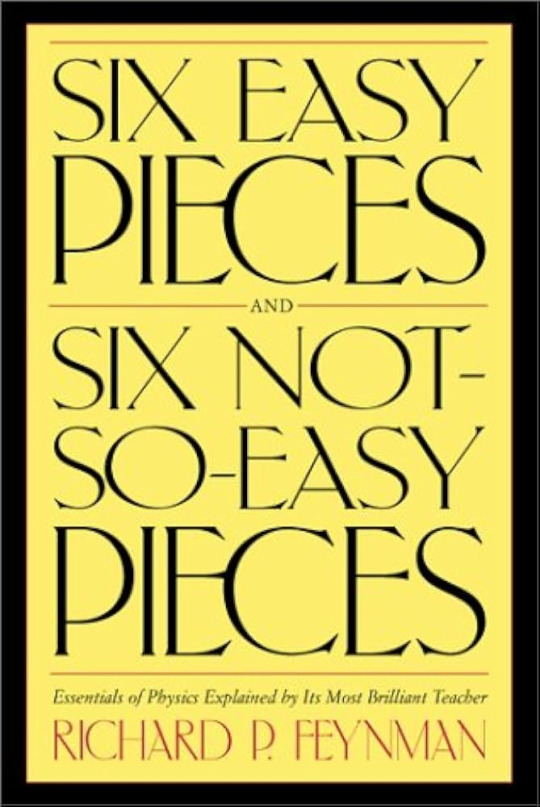
Six Not-So-Easy Pieces: Einstein's Relativity, Symmetry, and Space-Time by Richard Feynman
Another case of Bucky sticking with an author he likes! To me, this implies that Bucky has already read Feynman’s Six Easy Pieces, which explains some of the foundational basics of physics for a very broad and non-technical audience. Six Not-So-Easy Pieces is also drawn from Feynman’s famous Lectures on Physics, focusing here on relativity and space-time, but this work assumes a greater knowledge of math, hence the name. But as a legendary sniper Bucky must have a strong aptitude for math and anyway I just leaned into making Bucky an all-around nerd, because Bucky Barnes, nerd who grew up hot, is delightful to me.
Relativity, Symmetry, and Space-Time are all on point for a post-Endgame fix-it, which I think should count as a not-so-easy piece in its own right.
Throughout the series, we see Bucky using physical copies when he reads fiction, more or less from unconscious nostalgia: connecting back to memories of his younger self who was an avid reader of pulp magazines and cheap paperbacks. Once Steve gets him going with that first quietly tossed-over gift, Bucky always carries around a sci-fi or fantasy book in this series despite the limited space in his backpack. And this familiarity wouldn’t just be from his pre-war life since I figure Bucky would have gone for the Armed Services Editions that were distributed for free to soldiers. Bucky likely traded with other soldiers once he finished a book if he couldn’t get a new ASE distribution: trading in his finished novel for a new one is Bucky unconsciously falling back into another old habit.
But for non-fiction, Bucky is absolutely here for the Modern Marvel of being able to carry around as many books as he likes on his phone. I figure Bucky would have used public libraries during certain stages of his recovery when he was homeless and migratory since they are a place to get information that is consistently available in cities; and a warm, quiet place you can go with a minimal number of security cameras. I headcanon a middle-aged librarian who has a few streaks of gray in her dark hair—and who reminds Bucky of someone but he has no idea who—explaining what e-books are to this tall, gaunt, soft-spoken homeless guy with an eye contact problem. And this person who isn’t the Asset anymore and isn’t Bucky Barnes yet has the out-of-nowhere thought: huh, whaddaya know. That’s pretty neat.

Nonlinear Dynamics And Chaos: With Applications To Physics, Biology, Chemistry, And Engineering by Steven H. Strogatz
Isolated systems tend to evolve towards a single equilibrium and these equilibrium points have been the focus of many-body research for centuries. But life is generally not that simple because most systems aren’t isolated. Often the dynamics of a system result from the product of multiple different interacting forces and objects in these systems can change between multiple different attractor wells over time. Or as Strogatz puts it:
As we’ve mentioned earlier, most nonlinear systems are impossible to solve analytically. Why are nonlinear systems so much harder to analyze than linear ones? The essential difference is that linear systems can be broken down into parts. Then each part can be solved separately and finally recombined to get the answer. This idea allows a fantastic simplification of complex problems, and underlies such methods as normal modes, Laplace transforms, superposition arguments, and Fourier analysis. In this sense, a linear system is precisely equal to the sum of its parts.
But many things in nature don’t act this way. Whenever parts of a system interfere, or cooperate, or compete, there are nonlinear interactions going on. Most of everyday life is nonlinear, and the principle of superposition fails spectacularly.
You can think of nonlinear dynamics as situations in which the sum of the parts is insufficient to understand the whole. This connects to multiple themes in this story as Bucky and Steve try to understand themselves, their lives and each other. But here Bucky is also just continuing to live his best life as a nerd with a strong intuitive knack for math, a high school education, an internet connection and a growing collection of science e-books. Or as Bucky puts it:
“It’s nice, though, like this smart guy is just talking to you but doesn’t assume you’re dumb because of what you don’t know.”
It’s touched on only very lightly in the series so far, but Bucky has a lot of complex feelings about higher education that relate to class, indirectly to sexuality, and go back to the experience of being the son of upwardly mobile working-class immigrants who were very bought-in on a traditional take on the American Dream.
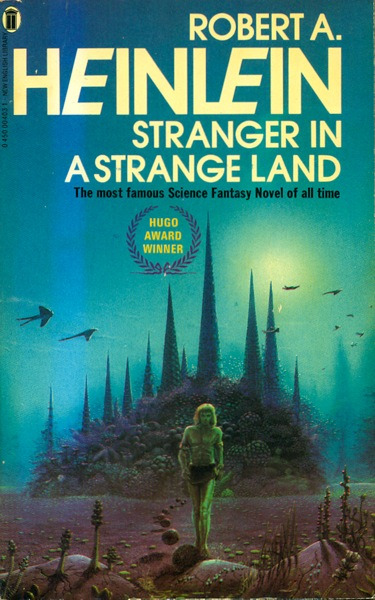
Stranger in a Strange Land by Robert A. Heinlein
I picked this partly because I thought the title would grab Bucky, who has been a stranger in a strange land several times over. Thematically this midcentury sci-fi novel focuses on challenging social norms through having the main character, a human who’d been raised by Martians on Mars, come back to Earth as an adult. A best-seller in its day that was controversial for its rejection of Christianity, monogamy and the nuclear family, the work is very tied to the looming cultural changes of the 60s and 70s.
The novel’s critical reputation has been steadily in decline for decades, but I think Bucky would find it interesting since he grew up within the traditional early 20th-century culture this novel satirizes and challenges—mores that this story’s version of Bucky didn’t unquestioningly accept but didn’t openly challenge, either.
Having Bucky pick this novel reflects the themes for the last act of this story that focus more on Steve and Bucky's different experiences as closeted queer men growing up in a deeply homophobic society. These experiences continue to shape and impact them and yet are also a past these two are coming to terms with and growing beyond.
Fun fact: this novel coined the word “grok.”
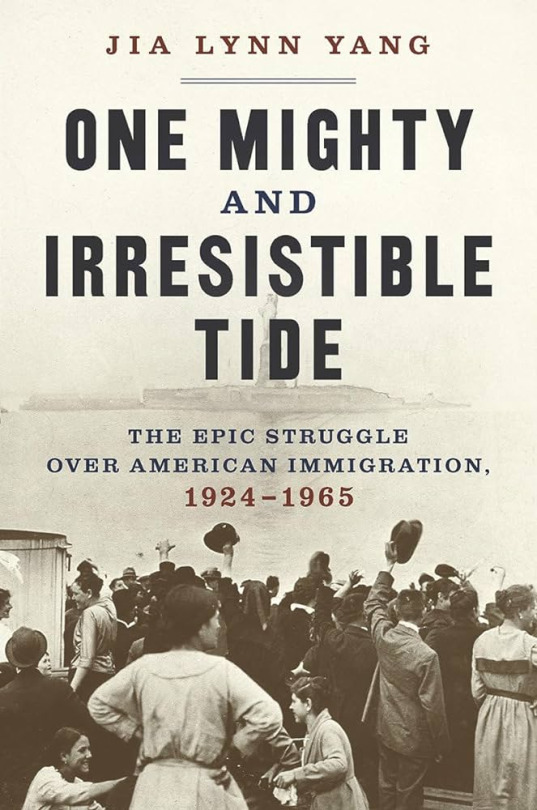
One Mighty and Irresistible Tide: The Epic Struggle Over American Immigration, 1924-1965 by Jia Lynn Yang
Of all the books featured in this series, One Mighty and Irresistible Tide is my top recommendation. This is an accessible, well-written history of a topic that haunts American history: immigration. The specific focus is the waves of legislation passed in the first half of the 20th century that tried—and often succeeded—in limiting who could legally immigrate based on the racial and ethnic hierarchies that equally haunt American history, right down to the foundation.
In this series, I wanted to pick up the themes of social justice and immigration that were so vaguely and incoherently included in TFATWS. These themes are inherent in the Snap and Return plotline except that Disney does not want to touch any of these politics with a ten-foot pole. But I remain fascinated by trying to wrap my mind around what it would mean for half the population to vanish and then return five years later, catastrophically in both cases. It’s a huge, intricate, sticky, difficult world-building problem that’s inescapably political.
Steve isn’t quite ready to dive into facing or helping to fix the problems of the post-Return world that his actions helped to create. But here we get to see Steve’s burned-out passion and conviction slowly rekindle as he reads about the complicated and often ugly history of American immigration—and he gets mad about it. Of course, he gets mad about it! This is my answer to the ludicrous idea that Steve Rogers could quietly sit out the second half of the twentieth century.
At the same time, I can have compassion for Steve knowing he can’t keep going but not knowing how to help himself, only to be given the cursed monkey’s paw of time travel. And he fucks up. His actions have real and lasting consequences. But that doesn’t make the situation hopeless or mean Steve can’t try to repair the relationships he damaged or work to regain the trust he lost, assuming he’s lucky enough to be given another chance by people who love him but have been hurt by his choices.
One of the greatest challenges in writing this Endgame fix-it was accepting Endgame as the starting point of the story and trying to reconcile a character I love with the choices canon has him make. Over the course of these stories, the central point isn’t Steve coming back to Bucky. It’s Steve coming back to himself. Through a slow and painful struggle, Steve finds himself again—rediscovering his stubborn endurance, his compassion for others and his drive to set wrongs right. Steve stumbled, badly, but he gets back up. Because that’s who Steve Rogers is.
And because of who Bucky Barnes is—his innate kindness, his warm-hearted generosity and his stubborn loyalty that isn’t blind but runs deep—that’s how these two characters come back to each other, after everything.
Deliberately, this series is the first hard-fought and hopeful glimmer in a long trudging process that can get so heavy to carry forward, day after day, but is shot through with moments of beauty and joy all the same.
I can't go on; I'll go on.
In other words, to quote one of my favorite poets: what the living do.
#thanks for the ask!#and the lovely comment#<333#book recommendations#stucky#stucky meta#lost vocabularies that might express#otp: till the end of the line#otp: even when i had nothing i had you#the existential loneliness of steven g. rogers#bucky barnes needs a hug#steve rogers also needs a hug#steve makes better choices#he's trying folks#all of my stories end up including a bunch of art and history#and I'm okay with that
19 notes
·
View notes
Text
Richard Feynman's, nickname Dick For-man.
0 notes
Text
Idk. So much of how ppl talk about the game seems to start from the assumption that it must be a deeply super communist story, and then is sort of wowed by its ability to sympathetically depict other viewpoints and criticise the failure modes of its own pov by making every communist you actually encounter into a self-important dick mainly concerned with elevating themselves above all their real world comrades by their consummate ideological purity, all while disengaging from or failing at any meaningful political change. These are indeed rare features of explicitly communist art in that they are evidence it’s not
It comes across as obnoxiously centristbrained to say the game doesn’t itself take up a firm position and is more-or-less an “equal opportunity offender” but sadly it’s basically accurate; I’ve never actually seen anyone argue for its communist credentials beyond pointing to biographical facts of the creators and rolling their eyes at dissent. Whenever i see anyone argue this from the internal evidence of the text, it takes the form of “Well assume it’s communist, and then look at [X] and you’ll find… wow, more communism!” reminding me forcefully of the painter Feynman describes who boasted of mixing yellow paint from red and white in a process that, upon inspection, involves a sprinkling of just a touch of yellow at the end. To the extent anyone is presented unambiguously sympathetically, it is the moralist cop who acknowledges his side has its fair share of atrocities while believing ultimately it is the only viable path forward
The game has the quality that it is disproportionately engaging and interesting to socialists to play, and that it deals with topics of intimate concern to socialist politics, but I think a minimal criterion of its being a “communist game” is that in the setting its brand of quasi-Marxism be correct and fruitful, whereas it takes minimal familiarity to see that this is not so
something i like about disco elysium is that although it has an obvious viewpoint (if you think the game isnt explicitly communist you're just wrong i'm afraid) it doesn't make the proponents of the other ideologies big silly goofballs to make this point--joyce and kim are wrong, both morally and factually, but they are wrong eloquently and compellingly. even measurehead, in the final cut, gets a long and compelling (and wrong! and fascist! to be clear!) monologue where he makes the case for his ideology.
3K notes
·
View notes
Text
In the MM Storyline, the first intimacy is sleeping together so he can learn how she experiences the process of becoming her each day, with the idea this will illuminate how he experiences that for himself. I just experienced that. I fixed on the idea of deferred gratification. It came to me while I was cutting up moldy bread for the birds which I put out just before realizing I forgot to cut out the moldy parts so I had to stop to soak it all down, which was my solution to the oops. Analytic to an End because no matter whether that decision is correct or not, or whether I could have done better (like by hand gathering every bit), that is the finite End which means this happened and cannot be undone, meaning that has counted, has wound, has been Registered.
So, let’s take a 7 or a 13. First, 4*13 hasn’t been explored at all. In CM terms, is that a connection to D12 so a Thing is the IC of L13 + D12, which is 2SBE2. So 13 is 2SBE2 + 1, and that means 4*13 is 4 Attachments to a 2SBE2. That is visual as a pyramid above L13, since the grid makes IC explicitly now - as per yesterday, to be honest - so LayerView now maps exactly to the labels ++ et al. And that End of 52 at that Bip connects then over some Thing which is identified by its 2SBE2 to describe the Thing made of both of these images, of the pyramid plus the 2SBE2. Again, this means a Thing is formed of 2Things. I can’t think of them as subThings because that imposes a hierarchy and generally a sense of direction. I mean that you can treat a Thing as bigger, as combining 2 sets, or as smaller, as combining parts of sets into a smaller set, like into a finite set. The one is created on top of, so it’s bigger, and the other is created below, so it is smaller, and they’re the same Thing. That’s inherent to I//I, that existence has to invert. I’m thinking about existence at this level, not at the physical, though that’s important. Let me start a new paragraph.
Existence has to invert is true because physical existence is an inversion of 1Space into 0Space so we fit as the 1 in the 0-1-0 of the enclosing 1Space. That sentence explains a lot about people. I’m startled by the depth of what I’m experiencing. It’s too much to put into words. I see weight, how behaviors fill gaps, how renormalization connects through the generation of the finite. That last grabs attention.
Analytic to the Ends, which means known, which translates to measurable. We finally got the full connection to renormalization as a grid squares effect, as a result of the way existence actually works. Feynman would love this. Hey, Dick, here’s the why. Sorry it took so long.
Measurable. A beat, a count, Lebesgue measure is of course a formulation of the concept of edges. Wow. That was deep and really came out of nowhere. I mean I typed measurable, tried to look it up, got lost on Facebook for a minute, thought about how it feels weird to log on and not know what people have been posting and that this impacts how I feel about the app, that there’s an element of discouragement because liking now means showing you didn’t know, then finally looking up Lebesgue measure, and this hitting me right away. This then is a second fundamental proof of the fundamental theorem of I//I over gs, that we define edges using Lebesgue measures and thus calculate within the 0Space exactly as we generate.
I need a break. Need some food.
0 notes
Text
Feynman be like
eigenpussy
1 note
·
View note
Text
thinking constantly about the physics presentation advice for undergrads that's like 'do NOT try to make a joke unless you are actually funny. you probably aren't' well I am deciding the best place to program in a little quip and a wink because I am funny and also charming
9 notes
·
View notes
Text
I miss Dick Feynman

Feynman: When we were talking about the atoms, one of the troubles that people have with the atoms is that they're so tiny, and it's so hard to imagine the scale.
The size of the atoms are in size - compared to an apple, it's the same scale as an apple is to the size of the Earth. And that's a kind of a hard thing to take, and you have to go through all these things all the time, and people find these numbers inconceivable. And I do too.
The only thing you do is you just change your scale. I mean, you're just thinking of small balls, but you don't try to think of exactly how small they are too often! Or you'd get kind of a bit nutty, alright?
But in astronomy, you have the same thing in reverse because the distances to these stars is so enormous, you see. You know that light goes so fast that it only takes a few seconds to go to the moon and back, or it goes around the Earth seven-and-a-half times in a second. And goes for a year, two years, three years before it gets to the nearest other star that there is to us.
But all of our stars are... the stars that are nearby in a great galaxy, a big mass of stars, which is called a galaxy, a group, well this, our galaxy is... what is it? Something like a hundred thousand light years, a hundred thousand years.
And then there's another patch of stars. It takes a million years for the light to get here, going at this enormous rate.
And you just go crazy trying to make too "real" that distance, you have to do everything in proportion. It's easy - you say the galaxies are little patches of stars and they're ten times as far apart as they are big.
So that's an easy picture, you know - he gets it. But you just go to a different scale, that's easier. You know, once in a while you try to come back to... Earth scale to discuss the galaxies but it's kind of hard.
The number of stars that we see at night is about - only about 5,000. But the number of stars in our galaxy, the telescopes have shown when you improve the instrument... Oh! We look at a galaxy. We look at the stars. All the light that we see, the little tiny and influent spreads from the star over this enormous distance of what? Three light years, for the nearest star. On, on, on! This light from the stars spreading, the wavefronts are getting wider and wider, weaker and weaker, weaker and weaker out into all of space, and finally the tiny fraction of it comes in one square, eighth of an inch, tiny little black hole and does something to me, so I know it's there.
Well, to know a little bit more about it, I'd rather gather a little more of this little, this tiny fraction of this front of light, and so I make a big telescope, which is a kind of funnel that the light that comes over this big area - 200 inches across - is very carefully organised, so it's all concentrated back so it can go through a... pupil. Actually, it's better to photograph it, or nowadays they use photo cells, they're a better instrument.
But anyway, the idea of the telescope is to focus the light from a bigger area into a smaller area so that we can see things that are weaker, less light, and in that way we find there's a very large number of stars in the galaxy.
There's so many that if you tried to name them, one a second, naming all the stars in our galaxy, I don't mean all the stars in the universe, just this galaxy here, it takes 3,000 years.
And yet, that's not a very big number. Because if those stars were to drop one dollar bill on the Earth during a year, each star dropping one dollar bill, they might take care of the deficit which is suggested for the budget of the United States.
So you see what kind of numbers we have to deal with!

151 notes
·
View notes
Text
once I learn to draw in clone high style it'll be over for you hoes
#jfk ponce de leon and dick feynman group pic#jesus christo and chadassah hang out. theyre bros#YES i have ch ocs#NO i will not be taking constructive criticism#YES i watch the show very critically#esp w ghandi shit#and yknow. Hannukah frankenstein lmso#one day I'll redesign ghandis foster parents#theo.txt
14 notes
·
View notes
Text
I just wanna know who the target audience for life lessons with uramichi oniisan was supposed to be
#if you've seen the dick feynman bit; that's from this anime lmao#this show just has such a specific brand of humor skdjddjjd#hoatm rants
1 note
·
View note
Text
Okay, you asked (well, @chemistink asked), so here is my running journal of thoughts about Life Lessons with Uramichi Oniisan. Please note that there is no real organization, rhyme or reason to these bullet points. Also note I am largely going off the anime, and I am not current on the manga, so uhhh yeah excuse me if any of this has been contradicted. CONTAINS SPOILERS. Cut for this and for length bc THIS IS LONG WOW
this show really do got that whole "developing family dynamic between a bunch of fuck-ups suffering through life" done pretty well, hitting you in the face right from the title. As a fellow fuck-up who once had a job with a work family like this, I can't imagine why this speaks to me /s
Despite my shipping preferences, I do get and appreciate that the work family dynamic informs the overall relationship between the cast. Under all the gags and hijinks, they've all got each other's backs. It's cool to see a work family portrayed in this way, as a dynamic that can form because of and in spite of a job, a company, and life impersonally and relentlessly fostering a disconnection from yourself and the stuff that matters. And like, as much fun as UraUsa is to ship, I also get that the stage cast, in their own varying ways, first and foremost admire and revere Uramichi as the big brother of their work family.
I wonder about Utano as Uramichi's and the casts' work big sister-- and whether she's *actually* his bio sister who ran away form home at 16 is definitely curious to consider. But even if she isn't, I get a strong sense that she just happens to be exactly like who his real sister would be if she were on the show.
Each of the main cast annoys, confuses, and amazes each other on the regular, and on top of life generally sucking. And life sucking especially hard in showbiz. But it's really nice to recognize that genuine human connection is what makes all the bullshit bearable, no matter how brief or individual that connection is. And that shared suffering is interpersonal glue.
Uramichi says he suffers through work because he wants to live - something most of us working class can connect with - but it's also made very clear that he doesn't just phone it in. It's clear the man busts his ass everyday because it's meaningful to the kids, which in turn is meaningful to him. However, the kids' show definitely isn't just random setting for the show. I think it's also pretty clear that Uramichi does what he does because he's also been in an extended mourning of his own childhood, and trying to regain some of the pure childhood joys he missed out on due to his strict and demanding father. He's therefore MUCH like Iketeru in this regard-- the latter of which has a veneer of being funny and adorable, but whose situation is actually just as fucked up and tragic as Uramichi's. Dick Feynman.
Look, I am down with most ships, and I am not about pissing in anyone’s cereal, it’s just that UraUsa's happens to be the shiniest ball of them all for me right now. Judge if you must. But I enjoy that their diametrically-opposed personalities create a balanced friendship, even if they seem to get along like oil and water. Or sodium and water.
On some level, they prob recognize that they each have something to learn from one another to achieve a happier balance in their lives. For Uramichi, it's how to smile and let go, and be less serious. And for Usahara, it's the opposite-- he could stand to be more serious and responsible. It's a telling sign of affection when they both show changes in behavior due to one anothers' dispositions & examples. For example, one of the first and only times in the show we see Uramichi smile, genuine and unforced, is when Usahara's in pain being his goofy, carefree self.
Usahara in turn, is moved by Uramichi's more serious approach to things, like his twisted ankle in college. Uramichi is the cause of one of the first and only times we see Usahara to do a responsible thing for himself by going to the clinic.
You could argue that they are both childish in different ways, and compared to the rest of the cast, they're all in various states of arrested development. Isn't that what a lot of adulthood really is about, though? Managing yourself as an overgrown child, and figuring out where to find the magic after it all seems to fade away?
All the above doesn't even touch on the psychological analysis you could probably delve into regarding Usahara controlling and voicing the hand puppet of Kotori-san, Uramichi's sleep demon. A demon who asks the types of questions Uramichi wants to avoid. A demon that uramichi can talk back to in the form of Usahara. This is one onion I'm a little scared to peel.
Speaking of sleep demons. Mine was a big giant 100-legged cockroach on my ceiling, and this show only makes me wish it had been holding a giant baguette. Or 100 tiny baguettes
kids do be noticing shit, and this is a feature
But circling back to UraUsa, I'm not convinced that the series will actually be ballsy enough to ever go for it outright, but I do have to wonder about some of the deliberate creative decisions going on with Usahara. I'm probably projecting my bisexuality/biromance like nothing else, but like...the hairclip. Being first in line point out Uramichi's specific tastes, wants to be up in Uramichi's biz 24/7, or that he's hot. That weird, awkward denial about Uramichi having a girlfriend in college (idk if I was missing something here but right now, yep, that happened). Or pot calling the kettle black when he accuses Kumatani of being an Iketeru wikipedia article. Or the fact that Capellini's character homes in on Usahara like no one else.
IMO the boundary-trouncing queen character gets my hackles up as a rather tired stock trope to see rear its head in an otherwise thoughtful comedy, but I also get that she refers to herself 'onee' and that this type of irony is in line with the show. TBH I have mixed feelings since she's not the worst example, and there are some moments I can appreciate.
But putting this aside, I bring her up because it's hard not to wonder at the function of Capellini as something like a lgbtq+ dowsing rod pointing to Usahara because in my experience, us non-straights tend to be pretty good at detecting and gravitating to one another.
Then there's EPISODE 12. Shit, jesus god. More on that later.
But on the other hand, there's Utano. The guy she's dating is an unsuccessful, aspiring comedian, from Kansai, afraid of bugs, and who needs her to be his mommy, yet she feels pressured to stick with him in the hopes he'll get around to marrying her. Usahara is also an aspiring comedian, also from Kansai, is also unsuccessful, is also afraid of bugs, and is also reliant on more responsible people to take care of him. This parallel puts my eyebrows in a goodamn twist.
It especially puts my eyebrows in a twist when we are shown Usahara fleeing to Uramichi for protection from a bug in the exact same episode we learn about Utano's bf's bugphobia. My brain both loves and hates stuff like this
UraUsa also frequently has coordinated colors and/or patterns, suggesting alignment. Ditto Kumatani and Iketeru. Utano also coordinates with Usahara and Uramichi.
Okay, I'm ready to discuss Episode 12. The episode where we learn Usahara has held some uh...intense and complex feelings for Uramichi since college.
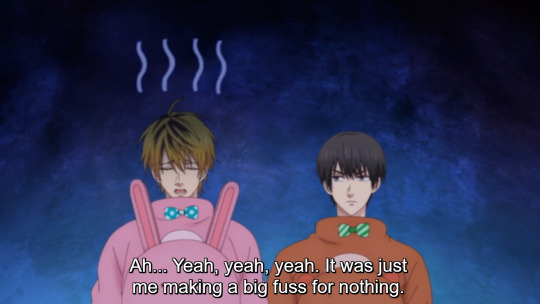
This is the remark toward the start of Episode 13 that bookends a giant segment where Usahara, after believing that Uramichi was quitting the show, goes through a downward spiral of panic and drunken mourning in Episode 12. A whole ass episode featuring Usahara's personal devastation over the thought of Uramichi leaving him behind. A whole ass episode that also took us down memory lane and underscored that while usahara has always had a carefree and irresponsible type of personality, and is uramichi's polar opposite in many ways, he's sharp as a tack about Uramichi as a person and genuinely adores admires him underneath all his (usahara's) nervousness about him. A whole ass episode I haven't even begun to scratch the surface of, but I will mention that it also features Usahara wondering whether his fate with Uramichi was bound by AN ACT OF GOD at one point
Kumatani is also shown in the same ep to have developed his own opinion and bond for Uramichi, too, albeit in his much more subtle, understated, and contrasted way. However, I just find it interesting how Kumatani looks at Usahara after having been the star witness to his entire freakout:

...and having known all along that Uramichi was not in fact leaving the show. He says he didn't tell usahara because usahara didn't ask...and I'm willing to take his word at face value. However, Kumatani is also someone who's been shown to be a huge sweetheart and is fiercely protective of his work family, so his decision also reads like he didn't want to interrupt while Usahara was working his feelings out, but idk. Maybe he also wants in on an UraUsa love sandwich, and I can't say I'd be upset with this outcome either.
Okay the end
#uramichi oniisan#urausa#I know I got the goggles on#usakuma is also intriguing ngl#long post#meta#I went way too deep
37 notes
·
View notes
Photo
#FFFxyz Love Dick... #MonaCOION WATTS DATA #idaFEYNMAN #idaEINSTEIN #RichardFeynman #Feynman a theoretical Physicist #wordsinlinespaceandtime #idaKLEIN #idamariapan #idealeconcepts #idealistamagica # #Physical #Law #patterns #AlbertEinstein #NASA #atomic #EtienneKLEIN #OPPENHEIMER #QuantumEntanglement #WALTDISNEY #WATTS #DATA #ai #MARVEL #impXYZ #X #YYZ #Tonysticazzi

Uncredited Photographer Theoretical Physicist Richard Feynman in His Classroom, Cal Tech, Pasadena, CA 1974
“Nature uses only the longest threads to weave her patterns, so that each small piece of her fabric reveals the organization of the entire tapestry.” Richard Feynman, “The Character of Physical Law” 1965
32 notes
·
View notes